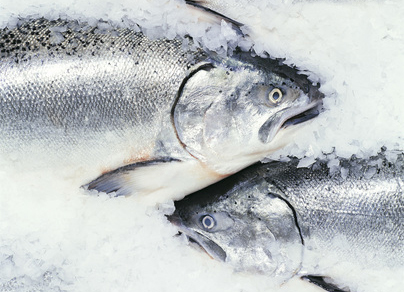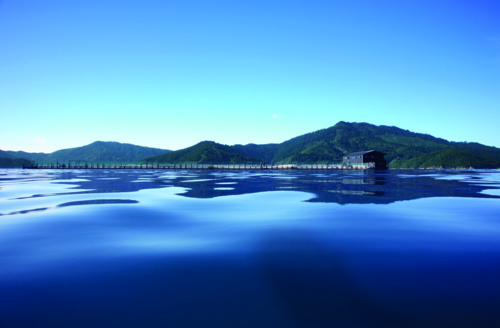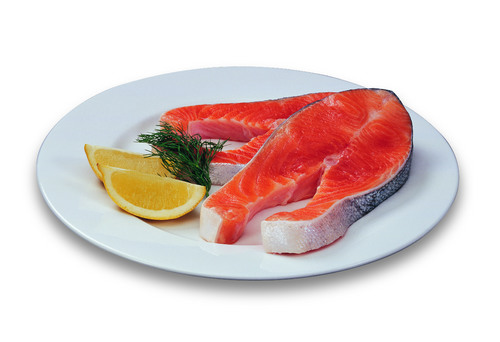I could talk all day with companies and scientists about looking for ways to make money from waste and I’ve been particularly interested in the work that New Zealand King Salmon (NZKS) is doing to sustainably generate revenue streams using all of their raw material. This is the kind of thinking I’m seeing more and more, as corporate responsibility becomes mainstream and customers become more vocal in their demands for ethical product offerings.
NZKS is capitalising on the huge worldwide demand for protein at the same time that its farming model is getting global attention receiving a Green/Best Choice rating from the international Seafood Watch programme. The company sources its ingredients from certified fisheries, is free of GMOs and has joined international programmes that focus on sustainability in the aquaculture sector. NZKS optimises its processes to ensure that the salmon are fed efficiently according to their weight, they harvest the salmon humanely and the company prides itself on working its practices in with the environment. Increasingly, New Zealand is being viewed as an ideal place to source primary products because of the country’s disease-free status and clean green image and accordingly, NZKS are in a prime position to prosper from this as they continually look for ways to be environmentally sustainable in their practices. The spin-off effects will come by way of rising customer numbers, increased revenue, enhanced reputation and company longevity.
NZKS is a good example of an organisation not shying away from the challenges of sustainably farming salmon and this appears to be paying off economically for NZKS. The company listed on the New Zealand and Australian stock exchanges in late 2016 and is developing new product lines and combining forces with others to capitalise on growing international markets.
“The wild salmon catch peaked years ago in terms of supply for a growing market,” says NZKS CEO Grant Rosewarne. “Therefore, we were in a strategic position as a farming operation to grow our business and at the same time, ensure that we retained and enhanced our environmental integrity throughout the process.”
Rosewarne realised that with the pending expansion, this would obviously create more secondary material and that the existing process for dealing with these by-products could not only be improved upon but could also be capitalised upon. As a result, the team at Omega Innovations (a division of NZKS) hatched a plan to extend the company’s product range by making better use of the 600 tonne per annum of available raw material.
As part of the strategic plan, we recently completed a project funded by the Bioresource Processing Alliance (BPA) and NZKS, looking at utilising the company’s salmon off-cuts for a new selection of treats for cats and dogs to complement a range of pet food products that Omega Innovations had developed. The existing process at NZKS rendered these by-products into fish meal and salmon oil, but Rosewarne and others believed that there was an opportunity to move higher up the value chain and take advantage of the unique salmon product characteristics that are in demand worldwide.
Associate Professors Nick Cave and David Thomas from Massey University undertook palatability trials on a selection of treats and wet and dry food the company had developed, and the feedback from the animals was clear enough. The company launched its Omega Plus (omegaplus.co.nz) product line in August last year.
“Pets are increasingly being viewed as not just an addition to the family but as one of the family,” claims Thomas. “As such people are spending more money on them and looking for high quality products that will increase the health, appearance and lifespan of their pets.”
“Having a well-balanced diet with natural raw materials is a trend that is not only applicable to humans but to pets as well. NZKS’ product range responds to this trend and therefore, should be well received in the market,” says Thomas.
NZKS has ensured premium pricing for its pet food range by only using salmon off-cuts that are fit for human consumption – in my view, a smart strategy that reflects the trend that Thomas refers to (particularly in international markets) for pets to be viewed as part of the family and subsequent expenditure to reflect this.
The company’s tactic reiterates that we don’t have to associate secondary streams or ‘waste’ as somehow being less appealing, less valuable or simply what’s left on the factory floor once the ‘real’ processing has been done. NZKS has demonstrated that by starting with a high value end product in mind – regardless of the consumer – and looking for ways to enhance the processing line, it can not only utilise more of its raw material but extend its product range and command higher prices as a result. Now that’s a waste to value advantage I could talk more about!






Leave a comment